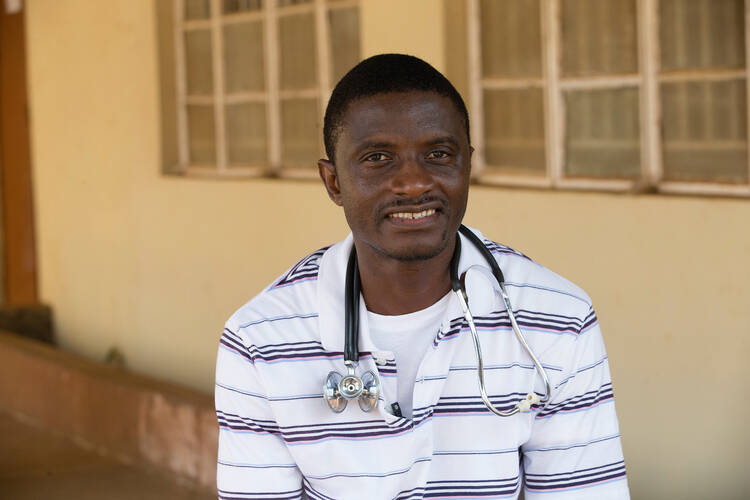Dr. Martin Salia, the Maryland Catholic doctor who died Nov. 17 after contracting the Ebola virus while serving in his native Sierra Leone, was remembered by his family and parish priest as a man who loved God and who loved to serve others.
"Dr. Salia lived the Gospel," said Father Rick Gancayco, pastor of St. Mary Parish in Landover Hills, where the late doctor and his family were members. "He lived his faith. He laid down his life for his friends."
Salia died at the Nebraska Medical Center after being flown there from Freetown, Sierra Leone, where he was serving as chief medical officer and surgeon at Kissy United Methodist Hospital. He was flown to the Omaha-based medical center -- one of only four U.S. hospitals designated to handle Ebola patients -- after he tested positive for the virus.
Several days before his death, Salia, 44, arrived at the Nebraska hospital in critical condition. He had shown symptoms of the virus about a week prior to his diagnosis, but the original tests came back negative. Once he tested positive, he was transported to the United States.
By then, he was already suffering from advanced symptoms of the disease, including kidney and respiratory failure. At the medical center, Salia underwent dialysis and was put on a ventilator. He was also given medications and plasma from surviving Ebola patients. Because his illness was so advanced, those protocols for treating the virus were unsuccessful.
The St. Mary School community organized a Nov. 21 memorial Mass for Salia. The late doctor's 13-year-old son, Hinwaii, is an eighth-grader at the school. Another son, 20-year-old Maada, is an altar server at the parish.
In his homily, Father Gancayco called Salia "a very special person who wanted to be where he was needed the most."
The physician divided his time between New Carrollton, where his family lives, and the hospital in Freetown. Sierra Leone, along with Liberia and Guinea, has been hard hit by the Ebola epidemic. More than 5,100 people have died from the disease.
"He chose to work in Africa, in a part of the world where many people are dying of a disease with no cure," Father Gancayco told the students and others at the Mass. "He worked to cure many people, most who were poor and could not pay."
He urged the students to "follow his (Dr. Salia's) example because he shows us what it is to be like Jesus. He was a humble man who wanted to be like Jesus."
Isatu Salia, the physician's widow, attended the Mass at which both her sons were altar servers. She said it is her hope that people are more interested in the way her husband lived than the way he died. "I want people to learn from him that you have to care for the poor, the needy and little children."
"He was a man of faith who was always preaching to his family to trust the Lord," she said after the Mass. "He used to tell us not to worry about tomorrow as long as we help the poor and needy today."
She noted that in his medical practice, Salia always gave credit to God because "my husband always said he treats, but God heals." Isatu said her late husband was the inspiration for her own conversion to Catholicism from Islam.
"He never pressured me to convert, but I used to ask God, 'Who is this man that I married who is so happy because of his faith?'" she recalled. "His heart and his behavior led me to convert. I am so blessed to have been married to this God-fearing, God-loving man."
She said that the Salia family prayed together every day, and "we even prayed together on the phone when he was in Africa."
"I loved him very much," Isatu said. "His last words to me were, 'I love you. God bless you.' He was preaching God even with his last breath."
Salia's son, Maada, 20, a student at Prince George's Community College, also recalled his father's strong faith.
"My father loved his faith and made sure his kids knew God," Maada said. "He was very religious and taught us to love everybody regardless of their color or age or religion."
Speaking of his father's work in Freetown, Maada said, "My father loved to help those in need. He sacrificed to make sure he helped people - he didn't care if they were wealthy or not."
Maada said that his father was willing to serve in his native country even though he knew that the Ebola epidemic was spreading in West Africa.
"My father wanted to help," Maada said. "He's a real role model. He was someone you could lean on, depend on. He was a hero to me."






